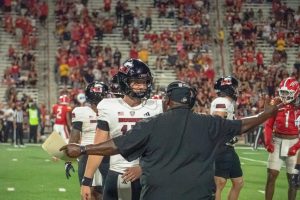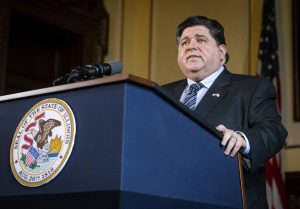Eastern Conference NBA All-Star Predictions
January 31, 2019
The NBA announced the 2019 All-Star starters Jan. 24. Golden State Warriors guard Stephen Curry, Houston Rockets guard James Harden, Oklahoma City Thunder forward Paul George, Golden State Warriors forward Kevin Durant and Los Angeles Lakers forward LeBron James will represent the Western Conference in the starting line-ups.
Boston Celtics guard Kyrie Irving, Charlotte Hornets guard Kemba Walker, Toronto Raptors forward Kawhi Leonard, Milwaukee Bucks forward Giannis Antetokounmpo and Philadelphia 76ers center Joel Embiid were voted to represent the Eastern Conference.
Antetokounmpo and James will be the captains of their teams due to receiving the most fan votes from the two conferences. They will draft the eight remaining players from the starter pool in the First Round of the NBA All-Star Draft Show 7 p.m. Feb. 7. before selecting the 14 players from the reserve pool in the Second Round.
Even though the captains can select their rosters without consideration to a player’s conference affiliation or position, NBA coaches must choose seven reserves from each conference to fill out the All-Star rosters. Here’s who I believe should be the reserves for the Eastern Conference:
Guard: Eric Bledsoe, Milwaukee Bucks
Bledsoe has been a menace on the defensive end for the Bucks. Milwaukee has the best defensive rating in the league and Bledsoe is a crucial reason why.
Under new Head Coach Mike Budenholzer, the big man drops back in pick-and-roll coverage for Milwaukee, protecting the rim and inviting opponents to take mid-range or pull-up 3-pointers.
A significant reason why his system has worked is how Bledsoe stays connected to the man he’s guarding despite being screened.
Opponents shoot 2.4% worse from the field when being guarded by Bledsoe, which is 11th among guards in the Eastern Conference who have played at least 25 games, according to the NBA’s official website.
Bledsoe has proven to be a steady tertiary option for Milwaukee, scoring 15.8 points per game on a career-high 49.2 field goal percentage. He converts shots at the rim at the rate of a center and plays his role in the Bucks’ defensive scheme to perfection.
Guard: Philadelphia 76ers guard Ben Simmons
Outside of shooting, Simmons has made integral improvements in nearly every aspect of his game from the 2017-18 season.
He’s finishing through contact at the rim at a higher rate. Simmons had become a better screener, doubling his screen assists per game output from last season and leading all guards in screen assists points per game, according to the NBA’s official website.
He’s collecting more offensive and defensive rebounds per game, and maintaining elite production as a playmaker and defender. Simmons’ shot may not look pretty, but he’s been very good in nearly every other aspect of the game.
Front-court: Orlando Magic center Nikola Vucevic
Vucevic is one of the most unique big men in the NBA. Only three others players are averaging at least 20 points, 12 rebounds and 3.5 assist per game; Antetokounmpo, Embiid and New Orleans Pelicans center Anthony Davis. Among that group, Vucevic has the best 3-point percentage at 37.7.
The Magic outscore teams by one point per 100 possessions with Vucevic on the floor, but are outscored by 11.2 points per 100 possessions when he’s on the bench. Vucevic’s positive impact on Orlando is undeniable.
He turns the Magic’s offensive to good from mediocre is a solid enough defender to not hurt the team on the less glamorous end of the floor. Vucevic is deserving of his first All-Star nod.
Front-court: Detroit Pistons forward Blake Griffin
Under new Head Coach Dwane Casey, the Pistons have fully embraced “Point Blake” and are unleashing him as the center of their offense.
With Griffin on the floor, Detroit scores at a rate of a league average offense with a 107 offensive rating. When Griffin is on the bench, the Pistons’ offense craters to easily the worst offense in the league, mustering up 96.3 points per 100 possessions.
Griffin has reinvented himself as a do-it-all forward who can make high level passes, knock down 3-pointers efficiently and score at a high rate. He deserves his first All-Star nod in four seasons because of his willingness to adapt.
Front-court: Milwaukee Bucks forward Khris Middleton
No other Bucks player has been more affected by Budenholzer taking over the coaching reigns. Middleton is playing five less minutes per game, he’s been tasked with swapping out his mid-range shots with 3-pointers and he’s isolating on offense less.
Middleton is the ideal non-superstar forward in today’s NBA. He’s a 3-and-D wing who can make plays off the dribble, create scoring opportunities for others and effectively guard the opposing team’s best wing.
Middleton is one of four players tallying 17 points, five rebounds and four assists per game on 37 percent shooting from beyond the arc.
The other three players are All-Star starters; Durant, Curry and George. Middleton’s game isn’t flashy, but it’s productive and should earn him a spot on the All-Star team.
Wild Card: Washington Wizards guard Bradley Beal
Similarly to last season, Beal has been the Wizards’ best player due to Washington guard John Wall struggling with injuries and playing his last game of the season Dec. 26.
Since Wall’s final game, Beal has averaged 27.5 points, six assists, 5.6 rebounds and 2.1 steals per game on 45.8 shooting from the field and 38.2 shooting on 3-pointers.
With or without Wall, Beal has proven for the second consecutive season he’s the Wizards best player and franchise cornerstone.
Wild Card: Toronto Raptors guard Kyle Lowry
In many ways, Lowry’s season has been slightly disappointing after a strong start. He’s having one of his worst scoring, shooting and turnover rate seasons since joining Toronto in 2012.
Yet, his playmaking ability has never been this prominent and he still remains a force on the defensive end. Leonard may be Toronto’s best player, but Lowry is the engine that keeps the team going, elevating the team to contender NBA title contender status.






